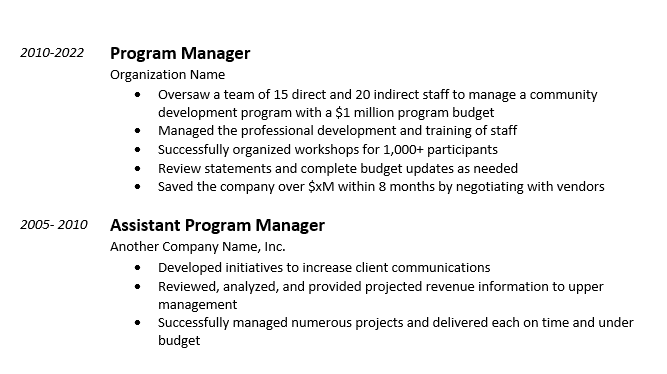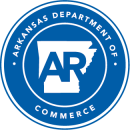Below is a quick guide to résumé writing, but if you would like in-person assistance with creating or updating your résumé, we are here to help! Visit an Arkansas Workforce Center or DWS office near you to access all of our free services.
Write a Résumé Step by Step:
- Choose the right résumé format
- Add your contact information
- Start with a heading statement- résumé summary or résumé objective
- List your relevant work experience and key achievements
- List your education
- List relevant skills that match the job post
- Add a cover letter
- Proofread, save, and email your résumé the right way
Résumé Format
A professional-looking MUST be done on a computer.
The most common résumé format is reverse-chronological format. You’ll list your most recent positions first, and go back through past jobs in reverse-chronological order from there. As the standard, basic résumé format, it tends to be the easiest to read and scan.
Contact Information
Necessary Contact Information:
- Name: First name, last name (middle name optional)
- Phone Number: Personal cell phone preferred
- Email Address: Today’s preferred means of communication
Optional Contact Information:
- Leave your address off your résumé (unless required)
- Résumé title
- Personal website
Heading Statement
Employers flip through résumés quickly. Reports have even shown that hiring managers scan a résumé and make an initial decision about you in under 10 seconds. That’s why a heading statement is so important! You’ve got to compose a statement that grabs attention, gets them interested, and paints you as a qualified candidate.
For your heading, you can choose to do a résumé summary statement or a résumé objective statement.
Got enough relevant experience? Choose the résumé summary statement. It summarizes your position-related qualifications.
Are you an entry-level applicant, career-changer, or student with limited work experience related to the position? Choose the résumé objective statement and highlight transferable skills from other areas.
Résumé summary statement example: Friendly and reliable call center agent with 5+ years of experience. Achieved the highest customer retention rate in the company. Met sales objectives consistently for 5 years in a row. Seeking to advance career by growing with the (name of company) team.
Résumé objective statement example: Motivated sales representative with 3+ years of experience at a large telecommunications company. I obtained high grades in relevant college courses including Marketing Strategy (100%) and Media Planning (97.3%). I seek to further my career by growing with the (name of company) team as an entry-level marketing associate.
Work Experience
List your work experience and be sure to include the following with every job history entry.
- Job Title
- Company, City, State
- Dates Employed
- Key Responsibilities
- Key Achievements
If you are adding more than one job history entry, start with the most recent position and go back in reverse-chronological order from there.

How much work experience should you include?
- Senior-level applicants should list up to 15 years of relevant work experience.
- Mid-level job seekers should include detailed job descriptions of relevant positions and a brief mention of any other positions.
- Entry-level candidates should list and describe all paid work, particularly calling out responsibilities and achievements that are most relevant.
- First-time job hunters with no work experience can still include other background information, such as time in an internship, student organization, or volunteer experience.
Education
If a position requires a specific educational background, make sure to include an education section on your résumé.
If you have little or no work experience, place your education section on top, with your work experience section below it. Otherwise, keep your résumé education section just beneath your work history.
How to list your education
- Place your highest degree first- add any other degrees after in reverse-chronological order.
- Include the dates the degree or certificate was acquired, the name of the institution, city, and state.
- If you finished a university degree, don’t add high school info.
- Some college on a résumé is fine, just list completed credits.
- Add any relevant coursework, honors, or awards.
- Consider including extracurricular activities.
Skills
Include a skills section and list what you do well that qualifies you for the job. Look at the description in the job post to which you are responding and use the job-related skills and keywords listed in that ad.
- Hard skills are specific abilities and know-how (e.g., cash register, forklift).
- Soft skills are self-developed, life-learned attributes (e.g., social skills, adaptability).
Don’t list irrelevant skills! You wouldn’t need to drive a forklift at an IT job, so you don’t need to list it as a skill.
Optional Information
Include additional information only if it would provide insight into your character and is pertinent to your job objective. Examples might be:
- Associations
- Awards
- Interests
- Special Qualifications
- Future Goals
Tailor each résumé so the information included is relevant to the particular position you are applying for.
References
Create a list of individuals who would present you positively to a prospective employer, preferably choose those who can discuss your work habits. Three references are ideal.
Possible references might be:
- Supervisors (past or present)
- Co-workers
- Volunteer coordinators
Do not include family members or relatives as references.
Note: Call your references and ask for permission prior to giving their name. Also, verify their current employer, title, and phone number. If your reference has changed jobs, include their current title, company, and phone number, in addition to the company where you were employed together.
Cover Letter
Most employers think a résumé is not enough to make a decision. Submitting a cover letter or job application letter lets you expand upon things that you need to keep brief on your résumé. Plus, a great cover letter that matches your résumé will give you an advantage over other candidates.
Proofread and Double-Check
Have someone check your résumé once you think it’s ready.
Ask them to look for any errors in:
- Your address and phone number
- Spelling, punctuation, and grammar
- Capitalization
- Consistency
- Spacing



